Creating a Daily Supplement Stack for Stress and Cortisol Management: A Science-Based Guide
Introduction
Modern life can be relentless. Between constant notifications, financial pressure, and emotional fatigue, your body’s stress response system is often running on overdrive. The result? Chronically elevated cortisol, the body’s main stress hormone. When cortisol stays high for too long, it leads to burnout, sleep problems, mood swings, inflammation, and even stubborn belly fat.
The good news is that you can retrain your body to handle stress more efficiently. Alongside mindful practices like meditation, proper nutrition, and sleep hygiene, creating a daily supplement stack can support your adrenal glands, calm your nervous system, and stabilize cortisol levels throughout the day.
This in-depth guide explores how to build a supplement routine that works with your body’s natural rhythms—morning, midday, and evening—to restore balance and resilience.
Looking for supplements for This? Click here.
🌞 Understanding Cortisol: Your Body’s Daily Stress Rhythm

Cortisol isn’t your enemy—it’s essential for survival. It wakes you up in the morning, helps you think clearly under pressure, and maintains blood sugar balance. The problem begins when stress becomes constant and cortisol no longer follows its natural curve.
Under healthy conditions, cortisol peaks in the morning (to energize you for the day) and gradually declines throughout the evening, allowing melatonin to rise and prepare your body for rest.
Chronic stress, poor sleep, excessive caffeine, and blood sugar fluctuations can flatten this rhythm. Instead of a smooth rise-and-fall pattern, cortisol stays elevated at night or drops too low in the morning, causing fatigue, irritability, and anxiety.
That’s where a well-structured supplement stack comes in—targeted nutrients can support adrenal recovery, improve stress resilience, and help bring your cortisol curve back into balance.
🌿 Morning Stack: Energize and Stabilize Your Cortisol Curve
The first few hours after waking are crucial for setting your hormonal tone for the day. The goal is to support natural cortisol elevation (not suppression) while preventing anxiety, caffeine crashes, and inflammation.
Adaptogens (Ashwagandha, Rhodiola Rosea, or Panax Ginseng)
Adaptogenic herbs are nature’s way of helping your body adapt to stress. They balance cortisol—raising it when it’s too low and lowering it when it’s too high.
Ashwagandha has been shown in clinical studies to reduce serum cortisol levels by up to 30%. It also improves sleep quality and reduces anxiety.
Rhodiola Rosea enhances energy and focus without overstimulation, making it ideal for morning use.
Panax Ginseng supports adrenal function and boosts stamina, helping combat “adrenal fatigue.”
B-Complex Vitamins
B vitamins—especially B5 (pantothenic acid), B6, and B12—are crucial for energy metabolism and adrenal health. Stress rapidly depletes these vitamins, leading to fatigue and brain fog. A well-balanced B-complex in the morning helps your body convert food into stable energy and regulate neurotransmitters like serotonin and dopamine.
Vitamin C
Often overlooked, Vitamin C plays a direct role in cortisol regulation. The adrenal glands use more vitamin C than any other organ when producing stress hormones. Supplementing 500–1000 mg per day can help buffer cortisol spikes and strengthen immune function.
Magnesium Glycinate or Malate
Magnesium supports over 300 enzymatic processes, including those that regulate stress and sleep. Magnesium malate is energizing and suitable for morning use, while magnesium glycinate is better before bed for relaxation.
Omega-3 Fatty Acids (EPA & DHA)
These anti-inflammatory fats found in fish oil support brain function and mood stability. They reduce cortisol responses to psychological stress and lower inflammation-related fatigue. Aim for 1000–2000 mg of combined EPA and DHA daily.
L-Theanine (Optional for High-Stress Mornings)
If you wake up anxious or jittery, L-Theanine (an amino acid from green tea) promotes calm alertness. It increases alpha brain waves, helping you focus without tension—perfect if you’re pairing it with morning coffee.
🕕 Example Morning Routine:
7:00 AM: Ashwagandha 300 mg + B-Complex + Vitamin C 1000 mg
8:00 AM: Breakfast with Omega-3 (1000 mg EPA/DHA) + Magnesium Malate
Optional: 100 mg L-Theanine with your coffee
This combination supports alertness, energy, and emotional steadiness while preventing early-day cortisol surges.
🌤️ Midday Stack: Balance Energy and Prevent Cortisol Crashes
By midday, your cortisol levels should naturally begin to decline. However, if you’ve had too much caffeine, skipped meals, or felt overwhelmed, you might experience anxiety, cravings, or afternoon fatigue. The goal of the midday stack is to maintain steady energy and focus without stimulating the adrenals.
Rhodiola Rosea (Second Dose or Alternate Adaptogen)
Taking a smaller dose of Rhodiola around lunchtime can help sustain energy and mental clarity. It also improves oxygen utilization and reduces physical and mental fatigue.
Phosphatidylserine
Phosphatidylserine (PS) is a phospholipid found in brain cell membranes. It’s one of the most effective compounds for lowering cortisol after mental stress. Studies show that 400 mg of PS can blunt cortisol spikes by up to 30%. It also supports memory and cognitive performance under pressure.
L-Tyrosine
This amino acid is a precursor to dopamine and norepinephrine, neurotransmitters depleted during stress. Supplementing with 500–1000 mg of L-Tyrosine can help you stay motivated and alert through long work sessions without overstimulating your system.
Electrolyte Minerals (Sodium, Potassium, Magnesium)
Cortisol affects fluid balance and electrolyte retention. During stressful days—or if you exercise—adding electrolyte powder or coconut water can prevent adrenal strain and stabilize energy.
🕛 Example Midday Routine:
12:30 PM: Lunch with Rhodiola 200 mg + Phosphatidylserine 200 mg
1:00 PM: L-Tyrosine 500 mg + Electrolytes mixed in water
This combo enhances resilience to stress, sustains motivation, and prevents the mid-afternoon crash.
Looking for supplements for This? Click here.
🌙 Evening Stack: Lower Cortisol and Prepare for Rest
As evening approaches, your body needs to shift from stress to recovery mode. The focus here is on calming the nervous system, promoting deep sleep, and supporting overnight hormonal repair.
Magnesium Glycinate or Threonate
These forms of magnesium promote relaxation and improve sleep quality. Magnesium glycinate binds with glycine, a calming neurotransmitter, while threonate has better brain penetration, enhancing cognitive restoration during sleep.
L-Glycine
This simple amino acid acts as a gentle nervous system relaxant. Taken with magnesium, it supports GABA function (your brain’s natural calming system) and helps you fall asleep faster.
Adaptogens for Night (Holy Basil or Reishi Mushroom)
If you’re prone to nighttime anxiety or restlessness, holy basil (tulsi) can gently lower evening cortisol and calm the mind. Reishi mushroom is another excellent option—it’s known as the “mushroom of calmness,” supporting immune health while promoting deep sleep.
Omega-3 (Second Dose, Optional)
If you didn’t take omega-3 in the morning, an evening dose can help reduce inflammation accumulated throughout the day and support neurotransmitter balance.
Herbal Sleep Aids (Chamomile, Lemon Balm, or Valerian)
These botanicals promote parasympathetic activation—the “rest and digest” state. A calming tea before bed can enhance your supplement routine and signal your body that it’s safe to unwind.
🕢 Example Evening Routine:
8:00 PM: Magnesium Glycinate (200–300 mg) + L-Glycine (3 g)
9:00 PM: Holy Basil or Reishi Extract + Herbal Tea
Optional: Omega-3 (1000 mg EPA/DHA)
This soothing stack helps reduce evening cortisol, improve sleep depth, and promote true nervous system recovery overnight.
💫 Bonus Additions for Comprehensive Cortisol Control
Vitamin D3 (Morning)
Vitamin D supports immune regulation and mood, both of which influence cortisol balance. Deficiency is associated with higher stress hormone levels and fatigue.
Zinc (Evening or with Dinner)
Zinc supports hormone balance, immune strength, and GABA receptor activity. It can also enhance sleep quality when taken at night.
Probiotics (Morning or Midday)
The gut-brain axis plays a major role in stress resilience. A healthy microbiome produces serotonin and GABA while lowering inflammatory signals that can drive cortisol.
N-Acetyl-Cysteine (NAC)
NAC boosts glutathione, the body’s master antioxidant, helping neutralize oxidative stress triggered by cortisol overproduction.
CoQ10 or PQQ (Morning)
For those experiencing fatigue or brain fog, these mitochondrial-support supplements enhance cellular energy and reduce oxidative damage linked with chronic stress.
🧘 Combining Supplements with Lifestyle Practices

Supplements are powerful tools, but they work best when integrated with daily habits that lower overall stress load. Think of them as the biochemical foundation—while mindfulness, movement, and rest are the behavioral anchors.
Meditation & Breathwork:
A few minutes of diaphragmatic breathing or mindfulness meditation daily can lower cortisol by activating the vagus nerve. Pairing adaptogens and magnesium with meditation amplifies their effects.
Want to try Breathwork? Click Here.
Exercise & Light Exposure:
Physical movement (especially strength training or yoga) improves cortisol rhythm and serotonin production. Morning sunlight further strengthens your body clock and supports vitamin D synthesis.
Therapy & Mindset Work:
Cognitive Behavioral Therapy (CBT) or Acceptance Commitment Therapy (ACT) can help reframe stress triggers, reducing the emotional load that keeps cortisol high.
Looking for online therapy ? Click Here.
Sleep Hygiene:
No supplement can replace sleep. Maintain consistent sleep and wake times, limit blue light at night, and use calming teas or magnesium to enhance melatonin production naturally.
🌿 A 24-Hour Cortisol-Balancing Blueprint
| Time of Day | Focus | Key Supplements | Benefits |
|---|---|---|---|
| Morning (7–9 AM) | Energize, balance cortisol | Ashwagandha, Rhodiola, B-Complex, Vitamin C, Omega-3 | Steady energy, stress resilience |
| Midday (12–2 PM) | Sustain focus, prevent crash | Rhodiola, Phosphatidylserine, L-Tyrosine, Electrolytes | Focus, reduced anxiety, motivation |
| Evening (8–10 PM) | Calm nervous system, restore | Magnesium Glycinate, Holy Basil, Glycine, Reishi | Deep sleep, cortisol lowering |
This rhythm mimics your body’s natural cycle—energized mornings, steady afternoons, peaceful nights.
🌻 How Long Until You Notice Results?
You may feel subtle benefits—like improved calm and focus—within the first week. But true hormonal balance takes time. Adrenal recovery typically requires 4–8 weeks of consistent supplementation, proper diet, and rest. Over time, you’ll notice:
Easier mornings
More stable moods
Less anxiety under pressure
Deeper, more restorative sleep
Remember: supplements don’t erase stress—they help your body handle it better.
🌙 Final Thoughts: Building Your Personalized Cortisol-Reset Stack
Cortisol regulation is about creating consistency, not perfection. The right supplement stack, combined with a balanced lifestyle, can retrain your stress response, improve energy levels, and strengthen emotional resilience.
Start simple. Choose one or two adaptogens that resonate with your needs—like ashwagandha for calm or rhodiola for focus—and build from there. Support your system with foundational nutrients like magnesium, B vitamins, and omega-3s. Add calming compounds at night to promote deep recovery.
Looking for online therapy ? Click Here.
🧾 References
Lopresti AL, Drummond PD. “Ashwagandha for the treatment of stress and anxiety: A systematic review.” J Evid Based Complementary Altern Med. 2017.
Panossian A, Wikman G. “Effects of adaptogens on the central nervous system and the molecular mechanisms associated with their stress—protective activity.” Pharmaceuticals. 2010.
Esch T, Stefano GB. “The neurobiology of stress management.” Neuro Endocrinol Lett. 2010.
Benton D, Donohoe R. “The influence of omega-3 fatty acids on mood and stress reactivity.” Nutr Res Rev. 2011.
Hellhammer DH et al. “The effects of phosphatidylserine on endocrine and psychological responses to mental stress.” Stress. 2004.
Blom EH et al. “The role of magnesium in stress regulation and mood.” Nutrients. 2018.
Raison CL, Miller AH. “When not enough is too much: The role of inflammation in stress-related disorders.” Am J Psychiatry. 2013.
Grossman P et al. “Mindfulness-based stress reduction and health benefits: A meta-analysis.” J Psychosom Res. 2004.
Kabat-Zinn J. Full Catastrophe Living. Bantam Books, 2013.
Varvogli L, Darviri C. “Stress management techniques: Evidence-based procedures that reduce stress and promote health.” Health Sci J. 2011.
Over time, you’ll feel it: fewer overreactions, steadier mornings, and a grounded sense of control—even in the middle of chaos. That’s what true cortisol balance feels like. 🌿
Related Posts
-
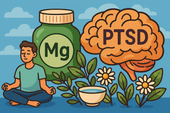
Magnesium and PTSD: Calming the Nervous System
Magnesium is one of the body’s most powerful natural stress relievers. 🌿 Learn how this essential mineral helps calm the nervous system, lower cortisol, ease anxiety, and support better sleep—making it a key ally for anyone recovering from trauma or PTSD.
-
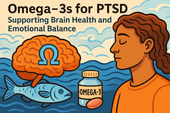
Omega-3s for PTSD: Supporting Brain Health and Emotional Balance
Omega-3s play a vital role in calming the brain and restoring balance after trauma. 🌊 Discover how these essential fatty acids support PTSD recovery by reducing inflammation, balancing neurotransmitters, improving sleep, and promoting emotional resilience—helping your brain heal from the inside out.
-
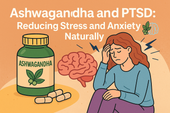
Ashwagandha and PTSD: Reducing Stress and Anxiety Naturally
Ashwagandha offers a natural path to stress and trauma recovery by calming the body’s stress response and restoring hormonal balance. 🌿 Learn how this powerful adaptogen can lower cortisol, ease anxiety, improve sleep, and support emotional resilience for those healing from PTSD.
-
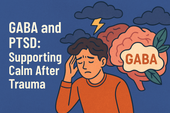
GABA and PTSD: Supporting Calm After Trauma
Therapy helps the brain rewire after trauma, restoring safety and self-trust. 🛋️ Discover how modern therapeutic approaches—like EMDR, CBT, and somatic therapy—help regulate the nervous system, calm intrusive memories, and rebuild emotional resilience for people recovering from PTSD and chronic stress.
-
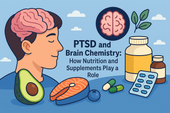
PTSD and Brain Chemistry: How Nutrition and Supplements Play a Role
PTSD isn’t just psychological—it’s deeply biological. 🧠 Learn how trauma reshapes brain chemistry and how nutrition, omega-3s, magnesium, B vitamins, and adaptogens can help rebalance neurotransmitters, reduce inflammation, and support emotional recovery from the inside out.
-
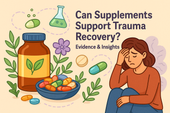
Can Supplements Support Trauma Recovery? Evidence & Insights
Can nutrients like Vitamin D and Zinc really support trauma recovery? 🌞 These two essential micronutrients play powerful roles in immune balance, inflammation control, and hormonal stability—all key systems disrupted by chronic stress and trauma. Learn how replenishing them can help restore strength and emotional resilience.
-
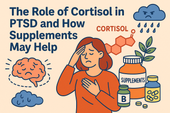
The Role of Cortisol in PTSD and How Supplements May Help
Your adrenal glands play a vital role in how your body responds to stress—but when they’re overworked, fatigue and anxiety can follow. 🌿 Learn how to support adrenal health naturally with nutrients, adaptogens like ashwagandha and rhodiola, and lifestyle habits that restore hormonal balance and steady energy.
-
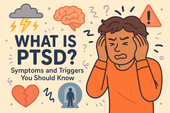
What Is PTSD? Symptoms and Triggers You Should Know
Post-Traumatic Stress Disorder (PTSD) can affect anyone who has experienced deep emotional or physical trauma. 🌪️ Learn how PTSD develops, what symptoms to look for, and the triggers that reignite distress—plus how understanding your body’s response to trauma is the first step toward healing and recovery.
-
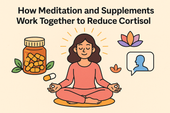
How Meditation and Supplements Work Together to Reduce Cortisol: A Complete Guide to Calming the Mind and Body
Meditation and supplements can work hand in hand to naturally reduce cortisol, your body’s main stress hormone. 🌿 Learn how mindfulness practices, adaptogenic herbs, and nutrient support like magnesium, omega-3s, and B vitamins create a powerful synergy for calm, focus, and emotional balance—backed by science and daily rituals that truly reset your stress response.
-
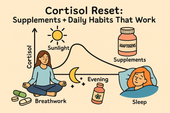
Cortisol Reset: Supplements + Daily Habits That Work
-
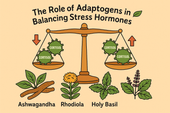
The Role of Adaptogens in Balancing Stress Hormones
Adaptogens work at the root of stress — your nervous system. 🌿 Learn how these powerful herbs help regulate cortisol, calm your nerves, and restore balance between energy and relaxation. ✨
-
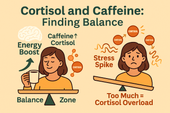
Cortisol and Caffeine: How Much Is Too Much?
Caffeine can boost energy and focus — but too much can overstimulate your stress hormones. ☕ Learn how caffeine affects cortisol, energy levels, and mood, and discover how to find the perfect balance for lasting calm and clarity. 🌿
-
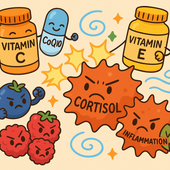
Antioxidants for Stress Management and Cortisol Control
When stress overwhelms your body, antioxidants come to the rescue. 🌿 Learn how vitamin C, CoQ10, and other natural compounds help reduce oxidative stress, regulate cortisol, and restore calm energy from within. ✨
-
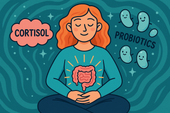
Cortisol and Gut Health: How Probiotics May Help
Chronic stress doesn’t just affect your mind — it changes your gut. 🌿 Learn how cortisol disrupts the microbiome and how probiotics can help restore balance, improve digestion, and calm your stress response naturally. ✨
-

Vitamin D and Cortisol: Supporting Immune Balance
Vitamin D does more than strengthen bones — it helps regulate cortisol and support immune balance. 🌞 Learn how this essential hormone-like nutrient restores calm, improves mood, and strengthens your body’s natural stress defenses. 🌿
-
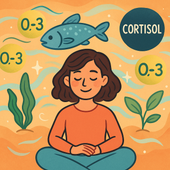
Omega-3s and Cortisol: Fighting Inflammation Naturally
Omega-3s are more than heart-healthy fats — they’re natural cortisol regulators. 🌿 Learn how EPA and DHA help reduce chronic inflammation, calm the nervous system, and support stress recovery from the inside out. ✨
-
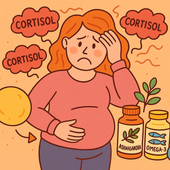
High Cortisol and Belly Fat: Can Supplements Help?
Chronic stress can make belly fat harder to lose — but supplements like ashwagandha, magnesium, and omega-3s may help restore cortisol balance. 🌿 Learn how science-backed nutrients support fat metabolism, calm your stress response, and bring your body back into harmony. ✨
-
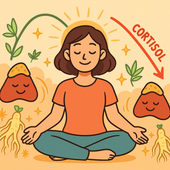
How Ginseng Can Support Energy and Cortisol Balance
Ginseng is one of nature’s most powerful adaptogens, helping your body handle stress without burning out. 🌿 Learn how this ancient root supports balanced cortisol, steady energy, and sharper focus — restoring vitality naturally and sustainably. ✨
-
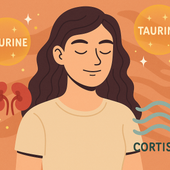
Taurine and Cortisol: Supporting Focus Under Stress
When cortisol surges, focus fades — but taurine helps restore balance. 🌿 Learn how this powerful amino acid calms your nervous system, regulates stress hormones, and sharpens concentration without jitters or fatigue. ✨
-
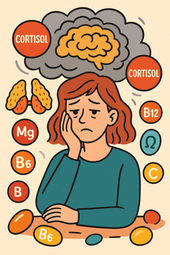
The Link Between Cortisol, Brain Fog, and Nutrient Deficiencies
When brain fog sets in, it’s not just in your head — it’s in your hormones. 🌿 Discover how cortisol imbalance and nutrient deficiencies like low magnesium, B vitamins, and omega-3s can cloud your focus and how restoring balance brings back mental clarity and calm. ✨
-
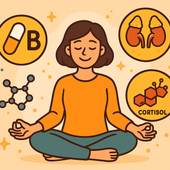
B Vitamins for Stress, Energy, and Cortisol Regulation
B vitamins are the foundation of stress resilience and steady energy. 🌿 Learn how this essential group of nutrients helps regulate cortisol, restore focus, and keep your nervous system calm — giving you balance from the inside out. ✨
-

Cortisol Imbalance and Chronic Fatigue: Can Supplements Help?
When chronic stress keeps cortisol high, fatigue and brain fog follow. 🌿 Learn how to rebalance your stress hormones naturally with calming nutrients, adaptogens, and lifestyle rituals that restore energy, focus, and inner peace. ✨
-

Adaptogen Stacks for Better Sleep and Lower Stress Hormones
Adaptogens can help your body recover from stress and sleep better by regulating key hormones like cortisol and adrenaline. 🌿 Learn how adaptogen stacks work to restore balance, calm the mind, and rebuild resilience — so you can rest deeply and wake renewed. ✨
-

Phosphatidylserine for Nighttime Cortisol Control
When stress hormones stay high at night, deep rest becomes impossible. 🌙 Discover how phosphatidylserine helps calm the brain, reduce nighttime cortisol, and restore healthy sleep rhythms — so you can wake up peaceful, clear, and recharged. ✨
-

Magnesium for Stress Relief and Cortisol Reduction
Magnesium is one of the most powerful natural tools for stress relief. 🌿 This essential mineral calms your nervous system, lowers cortisol, and helps your body recover from chronic tension. Learn how magnesium replenishes balance, improves sleep, and restores inner peace — naturally. ✨
-

Supplements to Improve Sleep by Balancing Cortisol
When cortisol stays high at night, sleep becomes a struggle. 🌙 Discover natural supplements that calm the nervous system, lower stress hormones, and restore your body’s natural rhythm. From magnesium and ashwagandha to L-theanine and phosphatidylserine, learn how to build deeper, more restorative rest. 🌿
-

Cortisol and Sleep: Why Stress Keeps You Awake
When stress keeps your body in fight-or-flight mode, cortisol refuses to calm down — and sleep becomes impossible. 🌙 Learn how elevated cortisol disrupts your circadian rhythm, suppresses melatonin, and turns restless nights into exhaustion. Discover how to restore balance and reclaim deep rest. ✨
-

L-Theanine for Cortisol Balance and Anxiety Relief
L-Theanine — the calming amino acid from green tea — helps quiet the mind and balance cortisol, the body’s key stress hormone. 🌿 Learn how it promotes calm focus, eases anxiety, and supports deep rest without sedation, backed by modern research and centuries of tradition. ✨
-

Rhodiola Rosea and Stress Resilience: A Natural Cortisol Regulator
Rhodiola rosea is one of nature’s most powerful tools for resilience. 🌿 This Arctic root helps balance cortisol, fight fatigue, and sharpen focus — keeping you calm yet energized even under stress. Discover the science behind Rhodiola’s adaptogenic power and how it helps your body thrive under pressure. ✨
-

Ashwagandha for Cortisol Balance: What the Science Says
Ashwagandha helps your body recover from chronic stress by calming the adrenal system and balancing cortisol — your key stress hormone. 🌿 Learn what science says about this powerful adaptogen, how it restores energy and focus, and why it’s one of nature’s most effective tools for modern stress relief. ✨
-

Supplements That Naturally Lower Cortisol Levels
When cortisol levels calm, your energy transforms — no more crashes or jitters, just steady focus and inner peace. 🌿 Learn which natural supplements and habits lower stress hormones, boost calm energy, and help your body thrive with balance instead of burnout. ✨
-

What Is Cortisol Imbalance? Symptoms You Shouldn’t Ignore
Cortisol — your body’s main stress hormone — keeps you alert and energized, but when it’s out of balance, it can drain your health. 🌿 Learn the signs of cortisol imbalance, from fatigue and anxiety to sleep disruption and stubborn weight gain, and discover how to restore calm, energy, and hormonal harmony naturally. ✨
-

The Best Daily Multivitamins for Menopausal Women
Menopause brings new nutritional needs that your old vitamin routine may no longer meet. 🌿 Discover how the right daily multivitamin can boost energy, balance mood, support bone and heart health, and keep your skin glowing. Learn which nutrients truly matter — from vitamin D to magnesium and B12 — to feel strong and vibrant every day. ✨
-

Antioxidants and Menopause: Fighting Inflammation Naturally
During menopause, oxidative stress and inflammation can quietly accelerate aging, fatigue, and skin changes. 🌿 Learn how antioxidants — from vitamins C and E to polyphenols in berries and green tea — help neutralize free radicals, reduce inflammation, and restore balance naturally. Discover the science of radiant, resilient aging. ✨
-

How CoQ10 Supports Heart Health After Menopause
After menopause, heart health becomes more important than ever. ❤️ Discover how CoQ10 — your body’s natural energy molecule — supports cardiovascular strength, restores vitality, and protects against oxidative stress. Learn how this essential nutrient helps keep your heart energized, balanced, and resilient through every stage of life. 🌿
-

Collagen Supplements for Skin and Joint Health Post-Menopause
After menopause, collagen loss affects both skin elasticity and joint comfort — but supplements can help rebuild from within. 🌸 Learn how collagen peptides, vitamin C, and other nutrients work together to restore firmness, reduce stiffness, and keep you glowing and mobile well into your next chapter. ✨
-

Calcium and Vitamin D: Protecting Bone Health in Menopause
Menopause brings hormonal changes that can weaken bones—but with the right nutrients, strength and stability can be rebuilt. 🦴 Learn how calcium and vitamin D work together to protect bone density, prevent fractures, and keep your body resilient. This guide explores nutrition, sunlight, and lifestyle habits that help your bones stay strong and vibrant for years to come. ☀️💪
-

Adaptogens for Energy and Resilience During Menopause
Feeling drained or emotionally scattered during menopause? 🌿 Discover how adaptogenic herbs like Ashwagandha, Rhodiola, and Ginseng can restore energy, balance cortisol, and build emotional resilience. Learn how these natural allies work with your body—not against it—to help you stay strong, focused, and calm through life’s hormonal changes. 🌸
-

Supplements That Help Beat Menopause Fatigue
Menopause fatigue can feel like more than tiredness—it’s a total energy crash. This guide explores how specific supplements, mindful breathwork, and therapy can help restore balance. Learn how nutrients like B vitamins, magnesium, and adaptogens rebuild your stamina, while breathwork and emotional healing calm your nervous system and bring vitality back to your days. 🌿✨
-

Herbal Blends for Menopausal Restlessness: Finding Calm in Transition
Herbal blends bring the wisdom of nature into moments of rest and renewal. Discover how soothing herbs like chamomile, lemon balm, and ashwagandha work together to calm menopausal restlessness, balance hormones, and invite deep relaxation. 🌿💫
-

Magnesium + Glycine for Deep Sleep During Menopause
Nutrients like magnesium, glycine, and B vitamins form the foundation for deep, restorative sleep during menopause. Discover how these natural compounds calm your nervous system, balance hormones, and help you wake up refreshed and recharged. 🌿💤
-

Melatonin and Menopause: Restoring Your Sleep Cycle
Nutrients are the foundation of hormone balance and energy. Learn how vitamins, minerals, and whole foods like greens, salmon, and berries nourish women’s bodies during menopause and beyond — restoring vitality, mood, and strength. 🌿🥗
-

How L-Theanine Helps With Menopausal Anxiety
Science continually deepens our understanding of the human body, from hormones to neurotransmitters. Discover how evidence-based research shapes modern wellness — bridging natural medicine, neuroscience, and hormone balance for healthier living. 🔬🌿
-

Can Ginkgo Biloba Improve Memory in Menopausal Women?
Hormone therapy can be a powerful tool for easing menopause symptoms and restoring balance. Learn how it works, the types available, and how to combine it safely with lifestyle and natural support for optimal well-being. 🌸💊
-

B Vitamins for Mental Clarity During Menopause
Nutrients are the foundation of mental and physical balance during menopause. Discover how vitamins, minerals, and whole foods like leafy greens, fish, nuts, and citrus can fuel energy, clarity, and calm while supporting hormonal health. 🌿✨
-

Mood Swings and Menopause: Natural Nutrient Support
Probiotics do more than support digestion — they help balance mood, hormones, and immunity too. Learn how a healthy gut microbiome can ease menopause symptoms, boost energy, and improve emotional resilience naturally. 🌿🦠
-

Brain Fog in Menopause: Supplements That May Help
Supplements can be powerful allies in restoring balance, energy, and focus—especially during menopause. Learn how nutrients like omega-3s, vitamin D, magnesium, and herbal adaptogens work together to support brain health, reduce stress, and promote lasting vitality. 🌿💊
-

Adaptogen Stacks for Reducing Night Sweats
Hormone detox isn’t about cleansing your body—it’s about restoring flow. Learn how the liver, gut, and endocrine systems work together to eliminate hormone buildup and how herbs like milk thistle, dandelion, and schisandra support balance, clarity, and natural vitality. 🌿💫
-

Cooling Menopause Symptoms with Herbal Support
Ashwagandha is one of nature’s most powerful adaptogens, helping women manage stress, sleep better, and balance hormones naturally. Discover how this ancient root supports calm energy, emotional resilience, and relief from menopause-related anxiety and fatigue. 🌿💫

















































